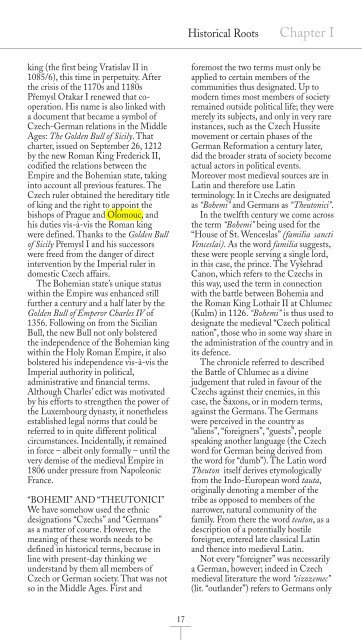the nationality of all inhabitants of the czech provinces and ...
the nationality of all inhabitants of the czech provinces and ...
the nationality of all inhabitants of the czech provinces and ...
Create successful ePaper yourself
Turn your PDF publications into a flip-book with our unique Google optimized e-Paper software.
king (<strong>the</strong> first being Vratislav II in<br />
1085/6), this time in perpetuity. After<br />
<strong>the</strong> crisis <strong>of</strong> <strong>the</strong> 1170s <strong>and</strong> 1180s<br />
Přemysl Otakar I renewed that cooperation.<br />
His name is also linked with<br />
a document that became a symbol <strong>of</strong><br />
Czech-German relations in <strong>the</strong> Middle<br />
Ages: The Golden Bull <strong>of</strong> Sicily. That<br />
charter, issued on September 26, 1212<br />
by <strong>the</strong> new Roman King Frederick II,<br />
codified <strong>the</strong> relations between <strong>the</strong><br />
Empire <strong>and</strong> <strong>the</strong> Bohemian state, taking<br />
into account <strong>all</strong> previous features. The<br />
Czech ruler obtained <strong>the</strong> hereditary title<br />
<strong>of</strong> king <strong>and</strong> <strong>the</strong> right to appoint <strong>the</strong><br />
bishops <strong>of</strong> Prague <strong>and</strong> Olomouc, <strong>and</strong><br />
his duties vis-à-vis <strong>the</strong> Roman king<br />
were defined. Thanks to <strong>the</strong> Golden Bull<br />
<strong>of</strong> Sicily Přemysl I <strong>and</strong> his successors<br />
were freed from <strong>the</strong> danger <strong>of</strong> direct<br />
intervention by <strong>the</strong> Imperial ruler in<br />
domestic Czech affairs.<br />
The Bohemian state’s unique status<br />
within <strong>the</strong> Empire was enhanced still<br />
fur<strong>the</strong>r a century <strong>and</strong> a half later by <strong>the</strong><br />
Golden Bull <strong>of</strong> Emperor Charles IV <strong>of</strong><br />
1356. Following on from <strong>the</strong> Sicilian<br />
Bull, <strong>the</strong> new Bull not only bolstered<br />
<strong>the</strong> independence <strong>of</strong> <strong>the</strong> Bohemian king<br />
within <strong>the</strong> Holy Roman Empire, it also<br />
bolstered his independence vis-à-vis <strong>the</strong><br />
Imperial authority in political,<br />
administrative <strong>and</strong> financial terms.<br />
Although Charles’ edict was motivated<br />
by his efforts to streng<strong>the</strong>n <strong>the</strong> power <strong>of</strong><br />
<strong>the</strong> Luxembourg dynasty, it none<strong>the</strong>less<br />
established legal norms that could be<br />
referred to in quite different political<br />
circumstances. Incident<strong>all</strong>y, it remained<br />
in force – albeit only form<strong>all</strong>y – until <strong>the</strong><br />
very demise <strong>of</strong> <strong>the</strong> medieval Empire in<br />
1806 under pressure from Napoleonic<br />
France.<br />
“BOHEMI” AND “THEUTONICI”<br />
We have somehow used <strong>the</strong> ethnic<br />
designations “Czechs” <strong>and</strong> “Germans”<br />
as a matter <strong>of</strong> course. However, <strong>the</strong><br />
meaning <strong>of</strong> <strong>the</strong>se words needs to be<br />
defined in historical terms, because in<br />
line with present-day thinking we<br />
underst<strong>and</strong> by <strong>the</strong>m <strong>all</strong> members <strong>of</strong><br />
Czech or German society. That was not<br />
so in <strong>the</strong> Middle Ages. First <strong>and</strong><br />
17<br />
Historical Roots<br />
Chapter I<br />
foremost <strong>the</strong> two terms must only be<br />
applied to certain members <strong>of</strong> <strong>the</strong><br />
communities thus designated. Up to<br />
modern times most members <strong>of</strong> society<br />
remained outside political life; <strong>the</strong>y were<br />
merely its subjects, <strong>and</strong> only in very rare<br />
instances, such as <strong>the</strong> Czech Hussite<br />
movement or certain phases <strong>of</strong> <strong>the</strong><br />
German Reformation a century later,<br />
did <strong>the</strong> broader strata <strong>of</strong> society become<br />
actual actors in political events.<br />
Moreover most medieval sources are in<br />
Latin <strong>and</strong> <strong>the</strong>refore use Latin<br />
terminology. In it Czechs are designated<br />
as “Bohemi” <strong>and</strong> Germans as “Theutonici”.<br />
In <strong>the</strong> twelfth century we come across<br />
<strong>the</strong> term “Bohemi” being used for <strong>the</strong><br />
“House <strong>of</strong> St. Wenceslas” (familia sancti<br />
Venceslai). As <strong>the</strong> word familia suggests,<br />
<strong>the</strong>se were people serving a single lord,<br />
in this case, <strong>the</strong> prince. The Vyšehrad<br />
Canon, which refers to <strong>the</strong> Czechs in<br />
this way, used <strong>the</strong> term in connection<br />
with <strong>the</strong> battle between Bohemia <strong>and</strong><br />
<strong>the</strong> Roman King Lothair II at Chlumec<br />
(Kulm) in 1126. “Bohemi” is thus used to<br />
designate <strong>the</strong> medieval “Czech political<br />
nation”, those who in some way share in<br />
<strong>the</strong> administration <strong>of</strong> <strong>the</strong> country <strong>and</strong> in<br />
its defence.<br />
The chronicle referred to described<br />
<strong>the</strong> Battle <strong>of</strong> Chlumec as a divine<br />
judgement that ruled in favour <strong>of</strong> <strong>the</strong><br />
Czechs against <strong>the</strong>ir enemies, in this<br />
case, <strong>the</strong> Saxons, or in modern terms,<br />
against <strong>the</strong> Germans. The Germans<br />
were perceived in <strong>the</strong> country as<br />
“aliens”, “foreigners”, “guests”, people<br />
speaking ano<strong>the</strong>r language (<strong>the</strong> Czech<br />
word for German being derived from<br />
<strong>the</strong> word for “dumb”). The Latin word<br />
Theuton itself derives etymologic<strong>all</strong>y<br />
from <strong>the</strong> Indo-European word tauta,<br />
origin<strong>all</strong>y denoting a member <strong>of</strong> <strong>the</strong><br />
tribe as opposed to members <strong>of</strong> <strong>the</strong><br />
narrower, natural community <strong>of</strong> <strong>the</strong><br />
family. From <strong>the</strong>re <strong>the</strong> word teuton, as a<br />
description <strong>of</strong> a potenti<strong>all</strong>y hostile<br />
foreigner, entered late classical Latin<br />
<strong>and</strong> <strong>the</strong>nce into medieval Latin.<br />
Not every “foreigner” was necessarily<br />
a German, however; indeed in Czech<br />
medieval literature <strong>the</strong> word “cizozemec”<br />
(lit. “outl<strong>and</strong>er”) refers to Germans only


